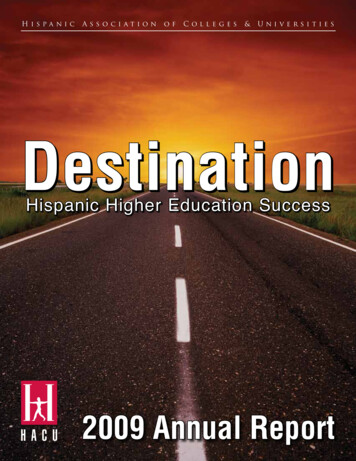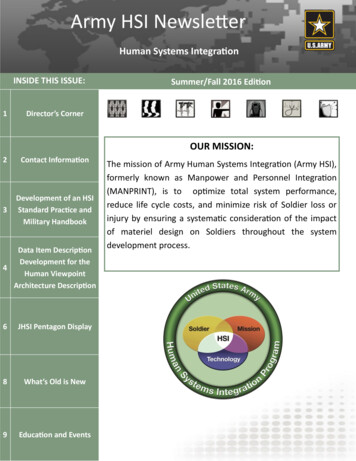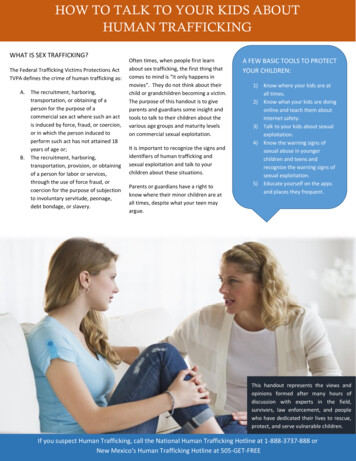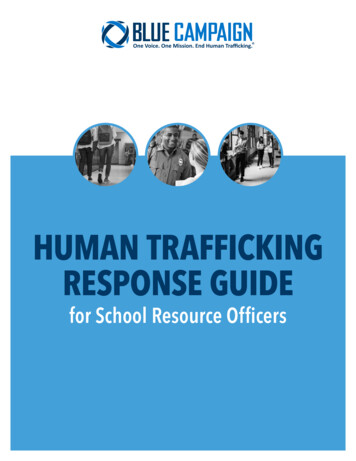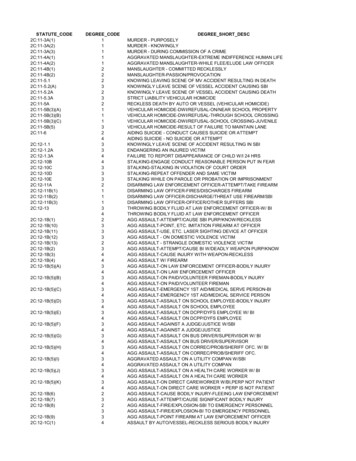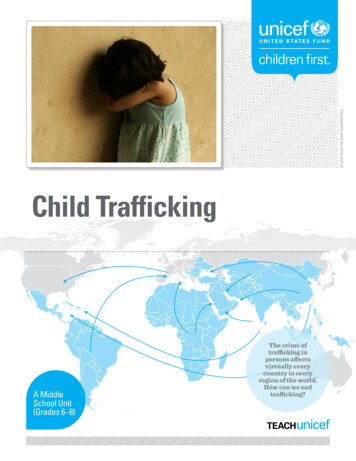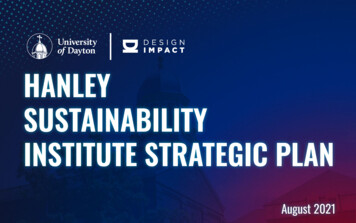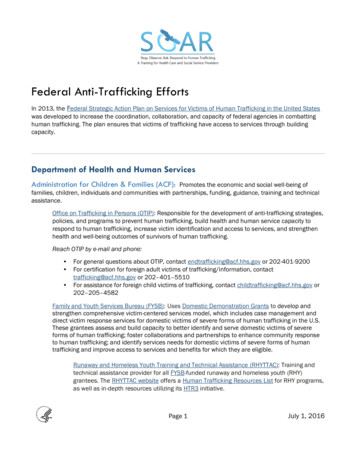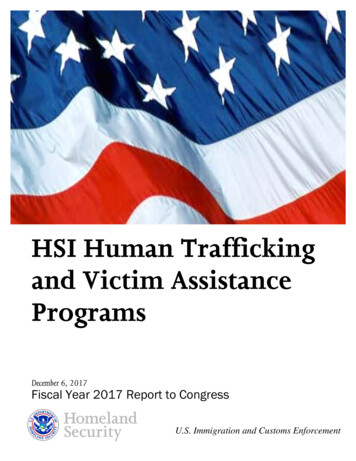
Transcription
HSI Human Traffickingand Victim AssistanceProgramsDecember 6, 2017Fiscal Year 2017 Report to CongressU.S. Immigration and Customs Enforcement
Message from the Office of the DirectorDecember 6, 2017I am pleased to present the following report, "HSI HumanTrafficking and Victim Assistance Programs," which has beenprepared by U.S. Immigration and Customs Enforcement (ICE).This report was compiled pursuant to Senate Report 114-264,which accompanies the Fiscal Year 2017 Department ofHomeland Security Appropriations Act (P .L. 115-31 ).Pursuant to congressional guidelines, this report is being providedto the following Members of Congress:The Honorable John R. CarterChairman, House Appropriations Subcommittee on Homeland SecurityThe Honorable Lucille Roybal-AllardRanking Member, House Appropriations Subcommittee on Homeland SecurityThe Honorable John BoozmanChairman, Senate Appropriations Subcommittee on Homeland SecurityThe Honorable Jon TesterRanking Member, Senate Appropriations Subcommittee on Homeland SecurityInquiries related to this report may be directed to me at (202) 732-3000 or to the Department'sDeputy Chief Financial Officer, Stacy Marcott, at (202) 447-5751.D. HomanICE Deputy Director and Senior Management OfficialPerforming the Duties of the DirectorU.S. Immigration and Customs Enforcement
Executive SummaryICE’s Homeland Security Investigations (HSI) conducts more than 1,000 human traffickinginvestigations annually. Many case referrals come from working in local task forces and fromnongovernmental organizations (NGO) providing community and victim services. SpecializedHSI victim assistance personnel provide victims with emergency assistance and referrals toNGOs that provide short-term and long-term direct services.The HSI Victim Assistance Program currently comprises a headquarters unit, 27 victimassistance specialists (VAS), and 6 forensic interview specialists (FIS) to assist victims in HSIinvestigations conducted by 6,400 HSI special agents worldwide. With an estimated currentbudget of 8 million, VASs referred 2,289 victims to NGOs and faith-based organizations,including 379 human trafficking victims from October 1, 2016, through August 28, 2017. FISsreceived 657 requests and conducted 462 forensic interviews during the same period.The Trafficking Victims Protection Act of 2017 proposes to expand the existing HSI VictimAssistance Program, increasing the number of HSI victim assistance personnel to an effortcommensurate with the victim assistance efforts of the Federal Bureau of Investigation and theExecutive Office for United States Attorneys. The creation of an HSI Office of VictimAssistance would ensure that all HSI human trafficking investigations would have benefit of theHSI victim assistance effort by locating a VAS where there is a human trafficking and/or childexploitation task force in which HSI participates and an FIS in each of the 26 HSI special agentin-charge offices nationwide. The legislation specifically states that the newly created office alsowould “collaborate with other federal, state, local and tribal governmental, nongovernmental,and nonprofit entities regarding policy, outreach, and training activities.”It would be feasible for HSI victim assistance personnel to increase NGO engagement, training,and referrals as part of the personnel expansion and funding at an estimated 25 million inFY 2018.ii
HSI Human Trafficking andVictim Assistance ProgramsTable of ContentsI.Legislative Language .1II.Background .HSI Victim Assistance Program & Partnering with NGOs .22III.Feasibility & Expenditure Plan .A. FY 2017 Expenditures .B. Expansion Proposed Through the Trafficking Victims Protection Act of 2017.444IV. Conclusion .6iii
I.Legislative LanguageThis report was compiled in response to legislative language in Senate Report 114-264, whichaccompanies the Fiscal Year (FY) 2017 Department of Homeland Security Appropriations Act(P.L. 115-31).Senate Report 114-264 states:HUMAN TRAFFICKINGICE plays a critical role in investigating criminal organizations traffickingindividuals into and within the United States. The Committee encourages DHS tocontinue working with appropriate nonprofit organizations and victim serviceproviders to improve the training of ICE officers in the field assisting in theidentification of human trafficking victims, especially children, and provideappropriate referrals to victim service organizations. The Committee also directsICE to report not later than 180 days after the date of enactment of this act on thefeasibility and costs associated with partnering with appropriate nongovernmental organizations on a human trafficking victim witness coordinatorprogram.1
II. BackgroundU.S. Immigration and Customs Enforcement’s (ICE) Homeland Security Investigations (HSI)conducts more than 1,000 human trafficking investigations annually. Many case referrals comefrom working in local task forces and from nongovernmental organizations (NGO) providingcommunity and victim services. Specialized HSI victim assistance personnel provide victimswith emergency assistance and referrals to NGOs that provide short-term and long-term directservices. This section provides an overview of the HSI Human Trafficking Program, as well asthe HSI Victim Assistance Program (VAP), and how HSI partners with NGOs.HSI Victim Assistance Program & Partnering with NGOsHSI is not a direct service provider, but relies upon an extensive network of NGOs to provideservices to victims assisting in HSI investigations. Fundamental to HSI VAP’s mission isbuilding partnerships with NGOs, which play a critical role in identifying victims, providingvictim services, restoring victims’ well-being, and stabilizing victims, all of which alsocontribute to a victim’s ability to become an effective witness. Healthy relationships betweenlaw enforcement agencies and NGOs involve recognition of what each brings to the table, clarityin roles and responsibilities, and focus on common shared goals, while respecting each other’slimitations.At the onset of a criminal investigation when a potential victim is identified, the victimassistance specialist (VAS) will contact an NGO service provider directly and coordinate asmooth transition for the victim to receive the services needed, all the while maintaining contactwith the victim for the duration of the investigation and subsequent judicial process. Serviceproviders work to meet victims’ short-term and long-term needs, including but not limited tohousing; food; clothing; medical; dental and mental health care; legal aid; long-term immigrationrelief, including T and U nonimmigrant visas; case management; English language training; andjob skill training.Over the years, VASs have developed strong partnerships and liaise with more than 200domestic and international NGOs, faith-based organizations, medical/mental healthprofessionals, and other federal law enforcement agencies, ensuring that each group has the latestinformation about federal resources that are available within the community. ThroughAugust 28, 2017, VASs conducted 618 outreach events providing training to more than 16,000participants, including NGOs, and federal, state, and local law enforcement agencies. The focusof these events was to: Raise awareness on human trafficking and victim identification;Recognize best practices in rescuing and interviewing victims;Educate law enforcement and NGOs on immigration relief; andProvide a forum for information exchange and collaboration.2
HSI domestic and attaché offices also conduct outreach and provide training to NGOs and tofederal, state, local, and foreign law enforcement partners regarding: 1) human traffickingindicators; 2) short-term immigration options for victims of trafficking; and 3) HSI’s expertiseand role in human trafficking investigations.3
III. Feasibility & Expenditure PlanA. FY 2017 ExpendituresAs described, VAP relies upon an extensive referral network of NGOs that provide directservices to victims and witnesses in HSI investigations. With current staffing levels, VAPreferred 2,289 victims to NGOs and faith-based organizations, including 379 human traffickingvictims from October 1, 2016, through August 28, 2017. During this same period, forensicinterview specialists (FIS) received 657 referrals and conducted 462 forensic interviews ofvictims in support of HSI investigations. Crime victimization included not only humantrafficking, but child exploitation, traveling sex offenders, white collar crime, and human rightsabuse, including female genital mutilation.The table below accounts for current VAP expenditures. Salaries for the VASs are paid by theHSI special agent-in-charge (SAC) office in which the VAS is located. The six FISs areconsidered HSI Headquarters employees, but are embedded in SAC offices located inLos Angeles, Detroit, Atlanta, Denver, Houston, and Chicago. Travel for FISs to conductforensic interviews of victims identified in HSI investigations is covered by HSI’s generalexpenditure fund.Position Description, Title,Series, & GradeUnit Chief (0343-GS-15)Section Chief (0101-GS-14)Forensic Interview Specialists (0101-GS-13)Victim Assistance Specialists (0101-GS-13)Position Non-1811-GS-13126281260 260,330 458,037 1,216,800 5,637,100379 7,572,267Personnel Salary TotalsHQ FTEsFY 2018B. Expansion Proposed Through the Trafficking Victims ProtectionAct of 2017The Trafficking Victims Protection Act of 2017 1 proposes to expand the existing HSI VAPconsisting of 27 VASs and 6 FISs to assist 6,400 HSI special agents in more than 200 offices,subject to the availability of funds. The creation of an HSI Office of Victim Assistance wouldensure that all HSI human trafficking investigations would have the benefit of HSI victimassistance efforts. The proposed expansion positions a VAS in every location where HSIparticipates in a human trafficking task force and an FIS in each of the 26 HSI SAC officesnationwide. The legislation specifically states that the newly created office also would“collaborate with other federal, state, local, and tribal governmental, nongovernmental andnonprofit entities regarding policy, outreach and training activities.” 212Trafficking Victims Protections Act of 2017, S. 1312, 115th Cong. (2017) (as reported to Senate, Aug. 1, 2017).Trafficking Victims Protections Act of 2017, S. 1312, 115th Cong. § 302(d)(3)(G) (2017).4
The expansion, as illustrated in the table below, would increase the number of victim assistancepersonnel to an effort commensurate with the Federal Bureau of Investigation (FBI) with morethan 200 victim specialists and the Executive Office for United States Attorneys (EOUSA) with213 victim coordinators, specialists, and advocates. 3 As part of the personnel expansion, it alsowould enable HSI victim assistance personnel to increase NGO engagement, training andoutreach activities, and referrals.Position Description,Title, Series, & GradeUnit Chief (0343-GS-15)Position TypeFTEsNon-1811-GS-151HQ FTEs1FY 2018 263,339Section Chief (0101-GS-14)Non-1811-GS-1411 231,576Victim Assistance Specialists (0101-GS-13)Non-1811-GS-131180 18,877,934Forensic Interview Specialists (0101-GS-13)Non-1811-GS-132626 4,200,763Regional Program Managers (0101-GS-14)Non-1811-GS-1440 638,197National Program Managers (0101-GS-13)Non-1811-GS-1344 650,611Mission Support (0343-GS-14)Non-1811-GS-1411 231,576General Attorney (0905-GS-14)Non-1811-GS-1411 231,576Personnel Salary Totals15634 25,325,5723In FY 2016, EOUSA received funding for 213 victim coordinators, specialists, and advocates and positionsproviding administrative support for victim services through the Crime Victims Fund. FBI receives funding forvictim specialists assigned to field offices across the country to personally assist victims of federal crimes and toprovide information on criminal cases as they progress and throughout court proceedings. (Source:https://ojp.gov/ovc/grants/types.html).5
IV. ConclusionHSI will continue to play a critical role in investigating criminal organizations traffickingindividuals into and within the United States. Essential partners in our efforts are NGO victimservices organizations that provide case management and social services that help to stabilizevictims. ICE will continue to develop strong partnerships with NGOs and other direct serviceproviders, while continuing to train HSI special agents in the field who assist in the identificationof human trafficking victims. It is a fundamental premise that NGO partnerships also help toensure that the community is aware of human trafficking and understands trafficking indicatorsin order to provide assistance and report it to law enforcement.HSI VAP is poised to increase the number of victim assistance personnel working alongside6,400 HSI special agents worldwide. This increase would serve all victims in HSIinvestigations, including human trafficking victims, and would, in turn, lead to an increase inHSI’s NGO engagement, training, and referrals. The creation of an HSI Office of VictimAssistance would ensure that all HSI human trafficking investigations would have benefit of theHSI victim assistance effort by locating a VAS where there is a human trafficking and/or childexploitation task force in which HSI participates and an FIS in each of the 26 HSI SAC officesnationwide. If enacted, the legislation specifically states that the newly created office also would“collaborate with other federal, state, local and tribal governmental, nongovernmental, andnonprofit entities regarding policy, outreach, and training activities.”6
HSI special agent-in-charge (SAC) office in which the VAS is located. The six FISs are considered HSI Headquarters employees, but are embedded in SAC offices located in Los Angeles, Detroit, Atlanta, Denver, Houston, and Chicago. Travel for FISs to conduct forensic interviews of victims identified in HSI investigations is covered by HSI's general
